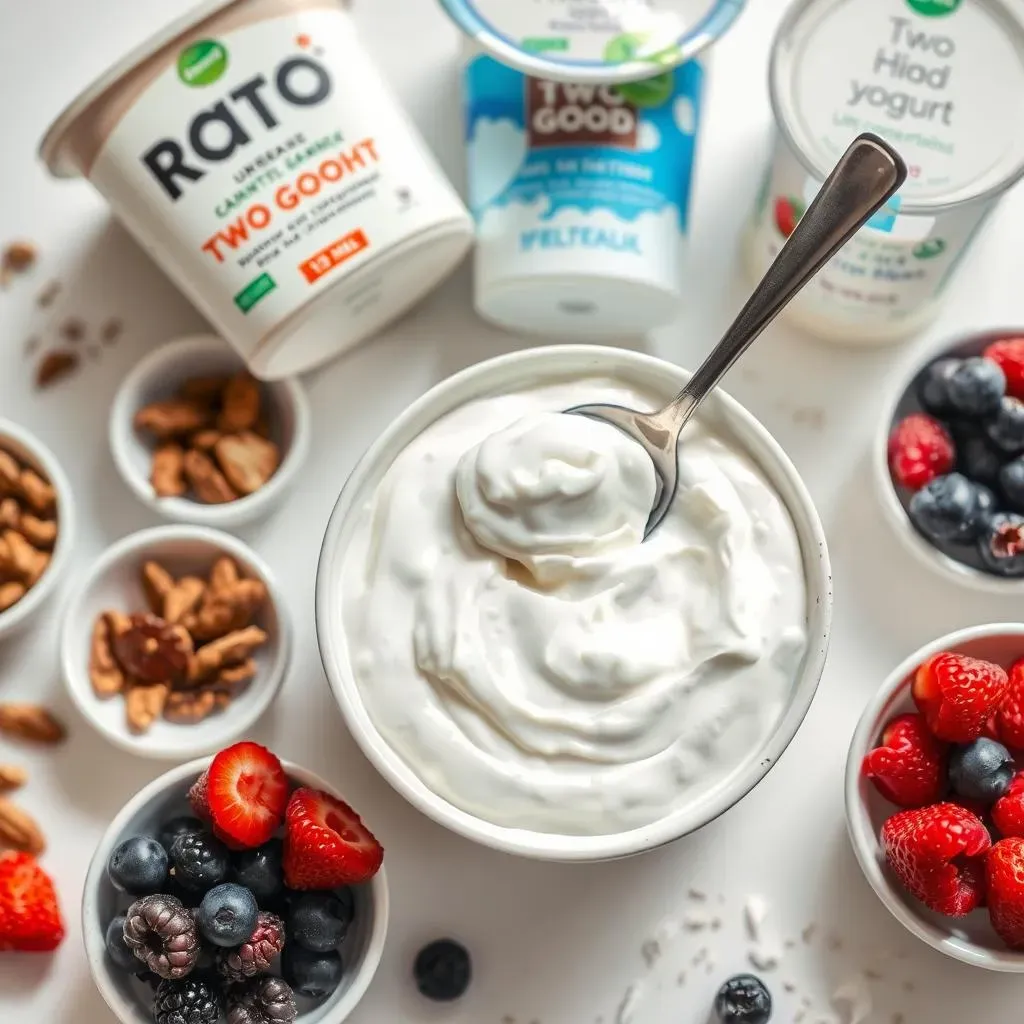Table of Contents
So, you're diving into the world of keto and craving that creamy, tangy goodness of yogurt? You're probably wondering: is low fat yogurt keto friendly? That's the million-dollar question, and the answer isn't a simple yes or no. The ketogenic diet, with its focus on high fats, moderate protein, and very low carbs, can seem at odds with many yogurts lining the grocery store shelves. Many are packed with added sugars and surprisingly high carb counts that can quickly kick you out of ketosis. But don't despair, yogurt lovers! This article will be your guide to navigating the yogurt aisle on keto. We'll break down the macros, compare full-fat versus low-fat options, highlight the best keto-friendly brands, and even explore how to make your own low-carb yogurt at home. Get ready to indulge in a guilt-free, keto-approved yogurt experience!
Understanding the Keto Diet and Yogurt: A Tricky Relationship

Understanding the Keto Diet and Yogurt: A Tricky Relationship
The Keto Basics: High Fat, Low Carb
so let's get down to basics. The ketogenic diet is all about shifting your body's primary fuel source from glucose (from carbs) to ketones (from fat). To achieve this metabolic state called ketosis, you drastically reduce your carb intake – typically to under 50 grams per day – and ramp up your fat consumption. This forces your body to become a fat-burning machine. It's like switching from a gas-guzzling car to a super-efficient hybrid... but with food!
Now, why is this "tricky" with yogurt? Well, many commercially available yogurts are loaded with added sugars, which translates to a high carb count. These sneaky sugars can derail your keto efforts faster than you can say "net carbs." Even seemingly "healthy" options can be surprisingly carb-heavy. It's a nutritional minefield, I tell ya.
Yogurt's Nutritional Profile: A Closer Look
Yogurt, in its purest form, can actually be a nutritional powerhouse. We're talking protein for muscle building, calcium for strong bones, and probiotics for a happy gut. These probiotics are live bacteria that support your digestive system and overall health. Plus, let's be honest, yogurt is just plain delicious and versatile. You can enjoy it as a snack, in smoothies, or even as a base for savory sauces.
However, the key is to carefully examine the nutrition label. Look beyond the marketing claims and focus on the numbers. Specifically, you'll want to pay close attention to the total carbohydrates, added sugars, and fiber content. Remember, fiber can help offset some of the carbs, as it's not fully digested by your body. We'll dive deeper into deciphering these macros in the next section.
Nutrient | Why It Matters on Keto |
|---|---|
Total Carbohydrates | Should be as low as possible to maintain ketosis. |
Added Sugars | Avoid like the plague! Contributes to carb count and offers no nutritional value. |
Fiber | Helps offset some of the total carbs. Look for yogurts with higher fiber content. |
Protein | Important for satiety and muscle maintenance. |
Fat | A key component of the keto diet. Opt for full-fat options. |
Navigating Yogurt Macros: Carbs, Fats, and the Keto Balance

Navigating Yogurt Macros: Carbs, Fats, and the Keto Balance
Decoding the Yogurt Label: A Keto Macro Masterclass
Alright, let's become label-reading ninjas! When you're eyeing a potential yogurt candidate for your keto diet, the nutrition facts panel is your best friend. The key is to focus on the magic trio: total carbs, net carbs, and fat. Total carbs are the total amount of carbohydrates in a serving, including sugars, starches, and fiber. Net carbs, on the other hand, are the carbs that your body actually digests and uses for energy. To calculate net carbs, simply subtract the grams of fiber from the total carbs. This is the number you really need to watch on keto.
Fat is your friend on keto, so don't shy away from full-fat options. Aim for yogurts with a higher fat content to help you meet your daily macro goals. Also, keep an eye on the protein content. While keto isn't a high-protein diet, adequate protein is essential for satiety and muscle maintenance. It's all about finding that sweet spot where the macros align with your keto lifestyle.
The Carb Count Conundrum: Added Sugars vs. Natural Sugars
Here's where things can get a bit tricky. Yogurt naturally contains lactose, a type of sugar found in milk. So, even unsweetened yogurt will have some carbs from lactose. The real culprits are the added sugars – things like sucrose, high-fructose corn syrup, and other sweeteners that manufacturers sneak into their products. These added sugars not only skyrocket the carb count but also provide empty calories and can wreak havoc on your blood sugar levels.
Always opt for unsweetened yogurt and sweeten it yourself with keto-friendly alternatives like stevia, erythritol, or monk fruit. This gives you complete control over the sweetness and keeps the carb count in check. Think of it as becoming the master chef of your own keto yogurt destiny! Plus, you can add delicious, keto-friendly toppings like berries (in moderation), nuts, and seeds to boost the flavor and nutritional value.
FullFat vs. LowFat Yogurt on Keto: Making the Right Choice

FullFat vs. LowFat Yogurt on Keto: Making the Right Choice
Why Full-Fat Reigns Supreme on Keto
On the ketogenic diet, fat isn't just a sidekick – it's the star of the show! That's why when it comes to yogurt, full-fat options are generally the way to go. Remember, keto is all about shifting your body's fuel source to fat, so consuming adequate amounts of healthy fats is crucial for staying in ketosis and feeling satisfied. Low-fat yogurts, on the other hand, often compensate for the lack of fat with added sugars and carbohydrates to improve the taste and texture. This can sabotage your keto efforts and lead to unwanted blood sugar spikes.
Think of it this way: full-fat yogurt is like a cozy, comforting blanket for your keto macros, while low-fat yogurt is like a flimsy sheet that leaves you shivering and craving more carbs. Which would you prefer?
The Downside of Low-Fat: Hidden Carbs and Additives
The biggest problem with low-fat yogurts isn't just the lack of fat; it's what they add to make up for it. To make low-fat yogurt palatable, manufacturers often load it with added sugars, artificial sweeteners, and other additives to improve the flavor and texture. These additions can significantly increase the carb count, making it difficult to stay within your daily keto limits. Plus, many artificial sweeteners can have unwanted side effects, such as digestive issues and cravings.
It's like a nutritional bait-and-switch! You think you're making a healthy choice by opting for low-fat, but you're actually getting a product that's loaded with unhealthy ingredients that can derail your keto progress. Always read the label carefully and be wary of low-fat yogurts with long lists of ingredients you can't pronounce.
Smart Swaps: Enhancing Full-Fat Yogurt
If you're concerned about the flavor of plain, full-fat yogurt, there are plenty of keto-friendly ways to enhance it without adding extra carbs. Get creative with your toppings! A sprinkle of berries (in moderation), a handful of nuts or seeds, a dollop of unsweetened whipped cream, or a dash of cinnamon can all add flavor and texture without compromising your keto goals. You can also add a few drops of stevia or erythritol for extra sweetness, if desired.
Another option is to use full-fat yogurt as a base for savory dishes. It can be used to make creamy dips, sauces, and dressings. Mix it with herbs, spices, and a squeeze of lemon juice for a delicious and healthy addition to your keto meals. The possibilities are endless! It is a great way to add in some flavor.
KetoFriendly Yogurt Brands and DIY Options: Your Best Bets

KetoFriendly Yogurt Brands and DIY Options: Your Best Bets
Store-Bought Saviors: Keto Yogurt Brands to Watch For
Alright, let's talk brands! Navigating the yogurt aisle can feel like decoding a secret language, but fear not, I'm here to equip you with the knowledge to spot those keto-friendly gems. Look for brands that specifically market themselves as "keto" or "low-carb," but always double-check the nutrition label to be sure. Some popular options include Ratio Keto Yogurt, Two Good Greek Yogurt (which uses a unique filtration process to reduce sugar), and Kite Hill Almond Milk Yogurt (for dairy-free folks).
Remember, even within these brands, some flavors may be higher in carbs than others, so always read the fine print. It's like being a detective on a mission to find the perfect keto yogurt!
DIY Yogurt: Control Your Carbs, Unleash Your Inner Chef
Want ultimate control over your yogurt's ingredients and macros? Then it's time to embrace the DIY approach! Making your own yogurt at home is surprisingly easy, and it allows you to customize the flavor and sweetness to your liking. All you need is some full-fat milk (or coconut milk for a dairy-free version), a yogurt starter culture, and a little patience. You can use a yogurt maker, an Instant Pot with a yogurt setting, or even just a warm spot in your kitchen.
The beauty of homemade yogurt is that you can use keto-friendly sweeteners like stevia, erythritol, or monk fruit to achieve your desired level of sweetness. You can also add flavor extracts like vanilla or almond, or mix in keto-friendly toppings like berries, nuts, or seeds. It's like having your own personal yogurt laboratory where you can experiment and create the perfect keto-friendly concoction!
Dairy-Free Keto Yogurt: Coconut, Almond, and Beyond
For those who are dairy-free or have lactose sensitivities, there are plenty of keto-friendly yogurt alternatives made from coconut milk, almond milk, or other plant-based sources. Just be sure to check the nutrition label carefully, as some dairy-free yogurts can be surprisingly high in carbs. Look for unsweetened varieties and add your own keto-friendly sweeteners and toppings. Some brands to look for include Kite Hill Almond Milk Yogurt, So Delicious Coconutmilk Yogurt, and Forager Project Cashewmilk Yogurt.
With a little creativity, you can enjoy all the creamy, tangy goodness of yogurt without any of the dairy drama! It's like having your cake (or yogurt) and eating it too!
Yogurt Type | Pros | Cons |
|---|---|---|
Store-Bought Keto Yogurt | Convenient, readily available | Can be expensive, may contain unwanted additives |
Homemade Yogurt | Customizable, cost-effective | Requires time and effort |
Dairy-Free Yogurt | Suitable for dairy-free diets | Carb counts vary, may have a distinct taste |
Conclusion: Yogurt on Keto – Choose Wisely, Enjoy Fully
Navigating the world of yogurt on a ketogenic diet requires a bit of savvy, but it's definitely achievable. While is low fat yogurt keto friendly might not always be the answer you're looking for, understanding macros, prioritizing full-fat options, and choosing the right brands can allow you to enjoy yogurt's creamy goodness without derailing your ketosis. Remember to always check labels, be mindful of added sugars, and consider making your own keto-friendly yogurt for ultimate control. So go ahead, grab a spoon, and savor the flavor – you've earned it!
